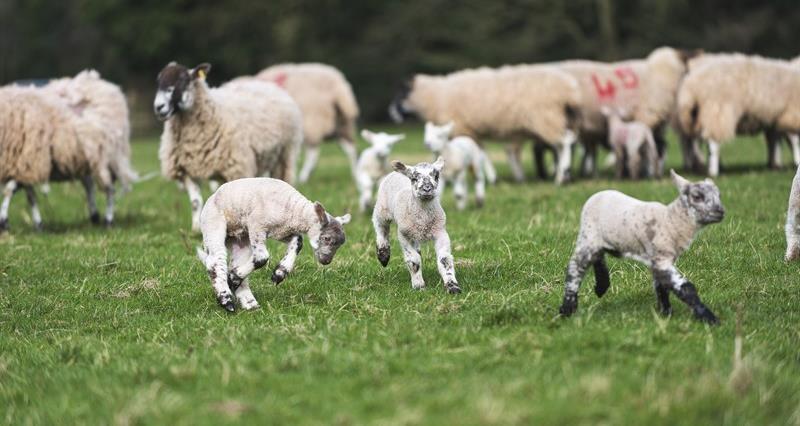What is Schmallenberg?
The Schmallenberg virus (SBV) is an insect borne viral disease, which is spread by biting midges. It can affect all ruminants (such as sheep, cattle, goats and deer) and camelids (such as llama and alpaca).
Symptoms in adult cattle include fever, milk drop and diarrhoea, and can also be the cause of late abortion or birth defects in new born cattle, sheep and goats.
It does not affect humans or food safety; meat and milk from infected animals are also safe to eat and drink.
The virus often spreads very quickly – disease can last between 2-7 days, after which immunity is formed. There is no vaccine available for SBV and no plans for production of a new vaccine.
Farmers should remain vigilant for signs of disease and report any suspicions to APHA or their private vet.
The last wave of Schmallenberg occurred between 2016-17, where over 200 cases were confirmed by APHA across sheep and cattle holdings in Great Britain.
Latest news
Cases of Schmallenberg have been rising across the UK since Autumn 2023.
From 1 December 2023 - 16 January 2024, a total of 63 cases have been confirmed to APHA. The majority of cases were found in stillborn lambs.
If possible, farms could consider moving the timing of mating until later in the year to avoid the risk of infection.
To date, cases have been confirmed in Carmarthenshire, Ceredigion, Cornwall, Devon, Dorset, Gloucestershire, Hampshire, Hereford, Isle of Wight, Kent, Leicestershire, Oxfordshire, Pembrokeshire, Shropshire, Somerset, Warwickshire and Worcestershire.
There are no plans for Defra to compensate farms that are affected by SBV.
Currently, SBV is not a notifiable virus, meaning that positive cases do not need to be reported to Defra.
Schmallenberg – spot the signs
As SBV often presents itself in late abortion or birth defects, infection often goes unnoticed until the gestation period has passed.
The acute disease usually lasts between 2-7 days in adult animals, before they begin to develop robust immunity. Symptoms include but are not limited to:
- milk drop
- fever
- diarrhoea
In dairy cattle, herd milk is found to drop on average between 0.3 and 1kg per cow, per day, over a period of one to four weeks. In sheep, clinical signs of SPV are often mild or absent.
Fertility signs
Not all birth defects are due to SBV – for example, it does not create extra or missing limbs, or cause gastrointestinal, skin or heart defects.
Some bulls can persistently intermittently excrete SBV in semen for up to 3 months post infection.
In female ruminants, SBV can cause deformities as the virus crosses the placenta and replicates in the central nervous system tissue. It also causes the maternal recognition of pregnancy, which results in early pregnancy loss.
Often birthing ruminants infected with SBV require a caesarean or fetotomy to deliver to avoid trauma to the dam.
Disease cycle
SBV circulates in midges, meaning that its circulation is very much weather dependent. Midge populations will increase in warm, wet years, so we tend to see midge numbers peaking in the summer.
Flocks or herds that are mating in the summer or early autumn are the worst affected. The length of gestation is also important; we expect to see clinical signs in sheep first, with cattle showing later.
It is likely that SBV last circulated during the 2017/18 mating season. In the UK, we are on the edge of the SPV endemic zone, where we tend to see explosive outbreaks every couple of years, reflecting a cycle of every 3-5 years when we have naïve animals exposed to circulating virus.
Culling of infected animals
There are currently no plans to cull infected animals, as SBV is likely to be transmitted by insects such as midges, making culling an ineffective means of stopping disease spread.
There is also evidence that once an animal is infected with SBV, they quickly develop immunity and are not likely to remain infectious.
Movement restrictions
There are no movement restrictions in place, nor is it likely for Defra to take restrictive action to contain disease.
This is because SBV cases that are being detected in new born animals are likely to be as a result of infection in the summer/autumn of 2023. Therefore, movement restrictions would likely be ineffective as SBV may already have been transmitted by insects across the country.
Help and support
If you are in need of help or support in the aftermath of a Schmallenberg infection on farm, there are a number of farming organisations that can help.
NFU CallFirst is also available for help and advice on farming, legal or technical issues on 0370 845 8458.

